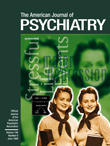Mania Onset While Using Dehydroepiandrosterone
To the Editor: Steroids are widely recognized as inducing changes in mood, including depression, euphoria, and psychosis with manic symptoms (1). Dehydroepiandrosterone (DHEA) is an adrenal steroid that is transformed into various compounds in many bodily tissues, including skin, muscle, brain, and reproductive organs (2). Adrenal production and serum concentration of DHEA are known to peak between ages 25 and 30 years and thereafter decrease with age. DHEA is widely available over the counter as a dietary supplement and has been widely touted as a fountain of youth and a sexual tonic and promoted for a variety of ills (3). We report a case of severe mania occurring during the use of oral DHEA.
Dr. A, a 51-year-old married man, required involuntary hospitalization because of grandiose delusions, expansive and irritable mood, and extreme psychomotor agitation in May. In January, he had begun taking DHEA, 50 mg daily, to increase his energy level. In retrospect, he denied experiencing depressive symptoms at that time. He was also taking multivitamins and a beef liver extract tablet. Within days of starting to take DHEA, he noted increased energy and a sense of drive. Within 2 weeks, his wife noted gradually worsening psychomotor acceleration, insomnia, irritability, and grandiosity. About a week before hospitalization, he decreased his dose of DHEA to 25 mg/day because of his wife’s concern about his irrational and hyperactive behavior. He had no history of prior mania, depression, or psychiatric treatment. However, his baseline mood status may have been mildly hypomanic, with a high level of energy and drive that had contributed to his professional success. His mother’s half sister had been repeatedly hospitalized for depression, but the family history was otherwise negative for psychiatric disorder, alcoholism, and suicide.
The severity of his psychosis necessitated the appointment of a temporary personal guardian with power of attorney. In the hospital, he responded slowly but well to a combination of haloperidol, 10 mg/day, and divalproex, 1500 mg/day, with serum levels of 81.3 ng/ml. Dr. A’s symptoms disappeared completely over several weeks. As his condition improved, he became increasingly insightful into the extent of his illness and experienced transient mild depressive symptoms in response to feelings of humiliation related to his acute mental illness. Haloperidol treatment was tapered and discontinued without recurrence of psychosis or insomnia, while Dr. A continued receiving divalproex. Four months after his hospitalization, he was symptom free, and he remained well on divalproex monotherapy.
The effect of orally administered DHEA depends on many factors, including serum levels of DHEA and the metabolic status of the body. In most tissues, DHEA is thought to exert antiglucocorticoid effects. DHEA is produced in the central nervous system as well as the human adrenals and is present in the brain, concentrated in limbic regions, in levels much higher than other steroids. DHEA has been postulated to function as an excitatory neuroregulator, antagonizing γ-aminobytyric acid transmission (4). Although it appears possible that Dr. A may have had a bipolar diathesis, oral DHEA may have played a role in the induction of his acute manic episode. Further research is needed to determine the mood effects of DHEA, including its potential risk for patients with bipolar disorder.
1. Peet M, Peter S: Drug-induced mania. Drug Saf 1995; 12:146–153Crossref, Medline, Google Scholar
2. Crenshaw TL, Goldberg JP: Sexual Pharmacology. New York, WW Norton, 1996Google Scholar
3. Skolnick AA: Scientific verdict still out on DHEA. JAMA 1996; 276:1365–1367Google Scholar
4. Robel P, Akwa Y, Compechot C, Hu Z-Y, Jung-Testas I, Kabbadj K, Le Goascogne C, Morfin R, Vourc-h C, Young J, Baulieu E-E: Neurosteroids, in Brain Endocrinology, 2nd ed. Edited by Motta M. New York, Raven Press, 1991, pp 105–132Google Scholar



